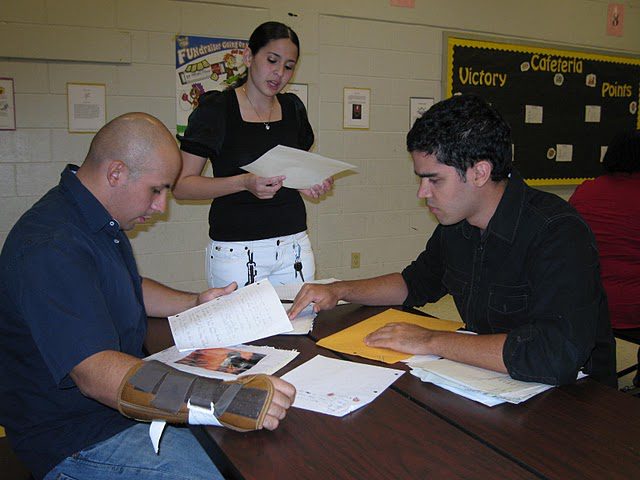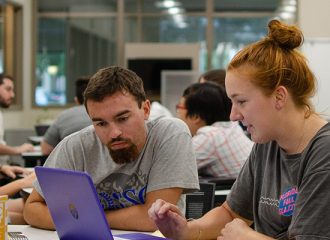by Katrina Kozorezov
According to their website, The Literary Arts Partnership at the University of Central Florida offers poetry and storytelling workshops in community settings to children, youth, and adults throughout Central Florida. We believe that poetry and storytelling are powerful tools that enhance literacy, learning attitude, character, and self-awareness. Our programs develop pride among community members and inspire UCF students to recognize their potential and bring about positive changes in their communities. Terry Thaxton is the founder and director of this partnership.
Recently, I had the opportunity to interview Judith Roney, an adjunct professor in the English Department here at UCF, who has participated in this program. She maintains that, “Earning an MFA degree isn’t all about ‘writing the next great American novel.’ Rather, skills learned in the classroom can be taken into the elementary schools, into hospitals and nursing homes, via well-constructed programs, and lives can be changed.”
She has led writing workshops at the following mental health centers: Aspire Health Partners, Wraparound Orange, and Lakeside Behavioral Health. While volunteering, Roney was able to not only help the timid writers find their voice, but she connected how creative writing is important to those who struggle with mental illness.
Professor Terry Thaxton points out that, “When we do these workshops, we don’t say we’re going to write about your experience being homeless, or we’re going to write about your experience being bipolar, or we’re going to write about your experience being a foster kid. These things just come out naturally when people are in that setting,”
Initially in 2003, Thaxton began working with five UCF students at a weekly poetry writing workshop at Pace Center for Girls, a high school for troubled and neglected girls. Since then, the organization has branched out to volunteer at the Coalition for the Homeless, Boy’s Town, Wraparound Orange, and Lakeside Behavioral Health.

Thaxton has always believed in giving back to the community, and within the walls of UCF, she has found others who believe so, too. Professor Laurie Uttich, in addition to holding nonfiction workshops and being a part of the university’s Creative Writing MFA board, has joined the LAP as co-director. When Thaxton is asked who inspired her to continue the work that she does, she is quick to mention Uttich as well as the names of published authors.
Without the help of equally passionate students, this foundation could not have gained its present success. Since 2003, many UCF alumni have come and gone. Most of them joined as volunteers, others were introduced to the LAP through the UCF class called, “Creative Writing in the Community.” Thaxton explains that students enrolled in that class work to become teaching artists. The first four weeks are dedicated to researching the site where they want to teach. They read about what others have done with similar organizations or specific groups of people and prepare a curriculum that they will use during their weekly writing workshops. Once students finish the twelve-to fifteen-week visits, they hold a reading. This course provides students with the chance to become familiar with the kind of work that the LAP does, while also receiving service and credit hours.
Professor Thaxton isn’t afraid to admit that volunteering is hard work. Her biggest concern has been and always is the lack of funding. “I would just like someone to give me a lot of money,” she says, spreading her hands shoulder width apart to emphasize just how much she would need. “Then I could give it to several GTA’s as a stipend and tuition waiver, so they could focus on teaching creative writing in the community. That way we can stay at Coalition for the Homeless and they could have their very own grad students and undergraduate volunteers each semester.”
When the LAP was first starting out, they did receive enough funding from the university to pay a few graduate students. But with the growth of extra-curricular activities, clubs, and events, there has not been enough to go around.
It has been more difficult to bring these workshops to public schools than Thaxton thought it would be. “I can send out an interest email to ten different principals and probably one out of those ten will email me back and commit,” says Thaxton.
Some schools welcome the LAP, seeing the value of tandem creativity and critical thinking, while others are too focused on standardized testing and the five paragraph essay. Although the LAP is part of the Writers in the Schools Alliance, Thaxton jokes that they would be better labeled the Writers in the Community Alliance.
Despite all of this, working with the LAP not only changes those that attend the workshops, but it changes the teachers as well.
“Being a part of all of these people’s lives always keeps me aware that every student is different and has a different background from the rest. So I’ve become more empathetic—a little more aware of differences, and that some people come from a very privileged background while others from an unprivileged one. Sometimes, the student that looks to be the most together is not,” says Thaxton.
Professor Thaxton has also learned to be more accommodating, as sometimes certain assignments can be difficult for students with mental illness or certain life experiences to accomplish. She works with those individuals to help them complete the assignment as it is, avoiding anything that can damage or bring unwanted pain.
Roney also recalls a moment that left a lasting impression, from when she led writing workshops as a GTA.
“There was one woman, whom we’ll call ‘Clarice,’ that came to every workshop at Lakeside. At first Clarice stayed in the background of the small room we had to use, though she was there every week. She had a slight stutter, and only spoke a little at first. She had difficulties in penmanship, but quickly she came to sit next to me each week, on my right. By the end of the semester, Clarice was freely expressing herself and seemed to relish each creative exercise. The smile I saw on her face each week as we would sit and listen to her read her work, and to have been able to see how safe she felt in our little room, was one of my favorite memories,” says Roney.
Moments like these that have encouraged people like Roney and Kristi DiLallo, a past UCF student who volunteered at Wraparound Orange in 2013, to continue with community work. Roney is currently working with a woman who is spearheading a group in her area that speaks to young students about the horrendous issue of human trafficking. Kristi DiLallo did not stop volunteering upon moving to New York to pursue her MFA at Columbia University. There, she was able to bring creative writing workshops to the incarcerated women on Rikers Island.
“Doing work in the community solidifies my belief that as a society we benefit when we get to tell our stories and people listen without judgment,” says Roney.
Lindsay Hunter is one of the original five students who worked with the LAP at Pace Center for Girls. She started the Facebook group Stronger Together – Acts of Service. The description section of the online group states, “A group where we can post acts of service we’ve done. Let’s keep each other posted, use check ins so we all are aware of opportunities where we can help, and let’s add as many of our friends and family to this as possible.” The admin herself posts daily about her own contributions and different opportunities available for the members of Stronger Together – Acts of Service.
A soft smile forms as Professor Thaxton says, “I’m so proud of her,” her eyes shining.
In her many years of volunteering, Thaxton has observed that people often start to volunteer because of preconceived, idealistic notions and the desire to change the world. Yet it is hard work. When they get out there and find themselves in the trenches— that’s when doubtful thoughts arise: “I’m only one person. I only get to come here one day a week for an hour. That’s not going to change the thousands and millions of people who are homeless. It’s not going to cure mental illness.” Then when they start to feel hopeless, and these thoughts lead to cynicism and distance them from the community.
Thaxton has an answer: “But if we keep going, we come to this sort of mature idealism where; Okay, I can’t change the entire world, but I can do this, this can be my part. And hopefully the ripple effect will cause others to take part as well. This a little cliché, but…you can change it; you can change a person’s life.”
Additional Resources:
- The Literary Arts Partnership UCF website
- Terry Thaxton’s UCF Faculty Webpage
- Laurie Uttich’s UCF Faculty Webpage
For those interested in volunteering or if you have questions regarding the availability of Creative Writing in the Community (CRW4804), email: terry.thaxton@ucf.edu




